Henry Campbell-Bannerman Worksheets
Do you want to save dozens of hours in time? Get your evenings and weekends back? Be able to teach about Henry Campbell-Bannerman to your students?
Our worksheet bundle includes a fact file and printable worksheets and student activities. Perfect for both the classroom and homeschooling!
Resource Examples
Click any of the example images below to view a larger version.
Fact File
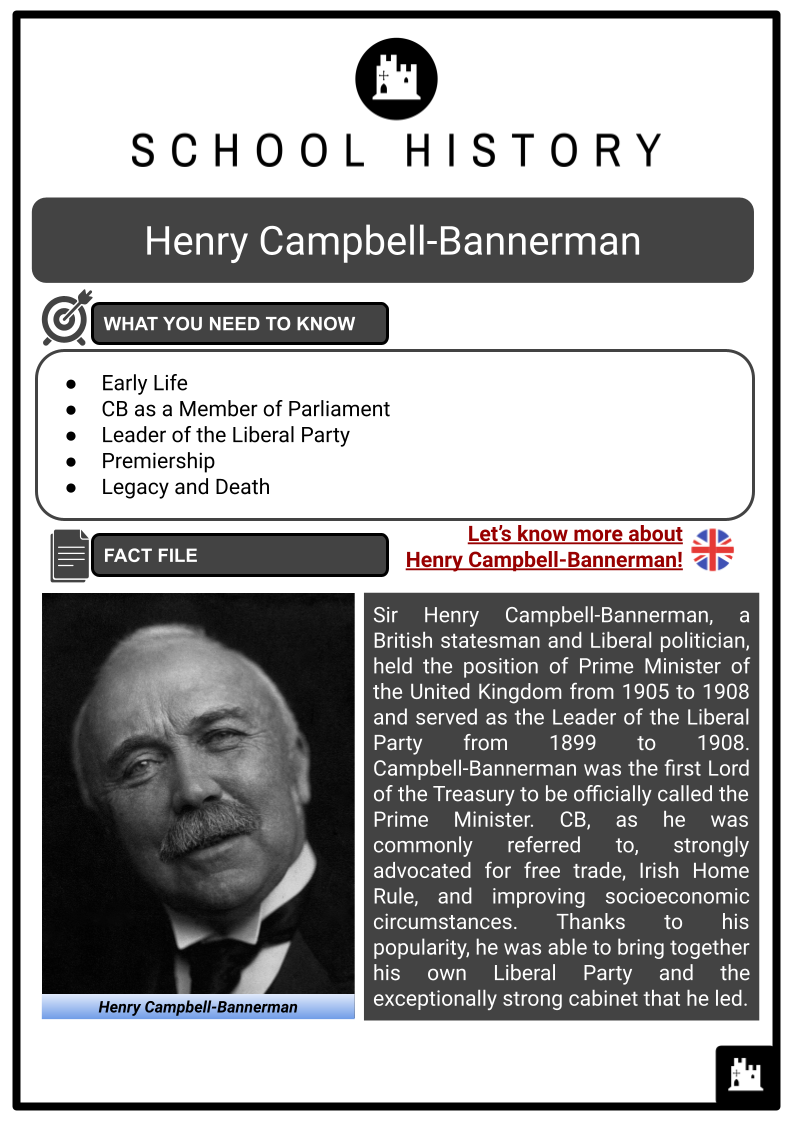
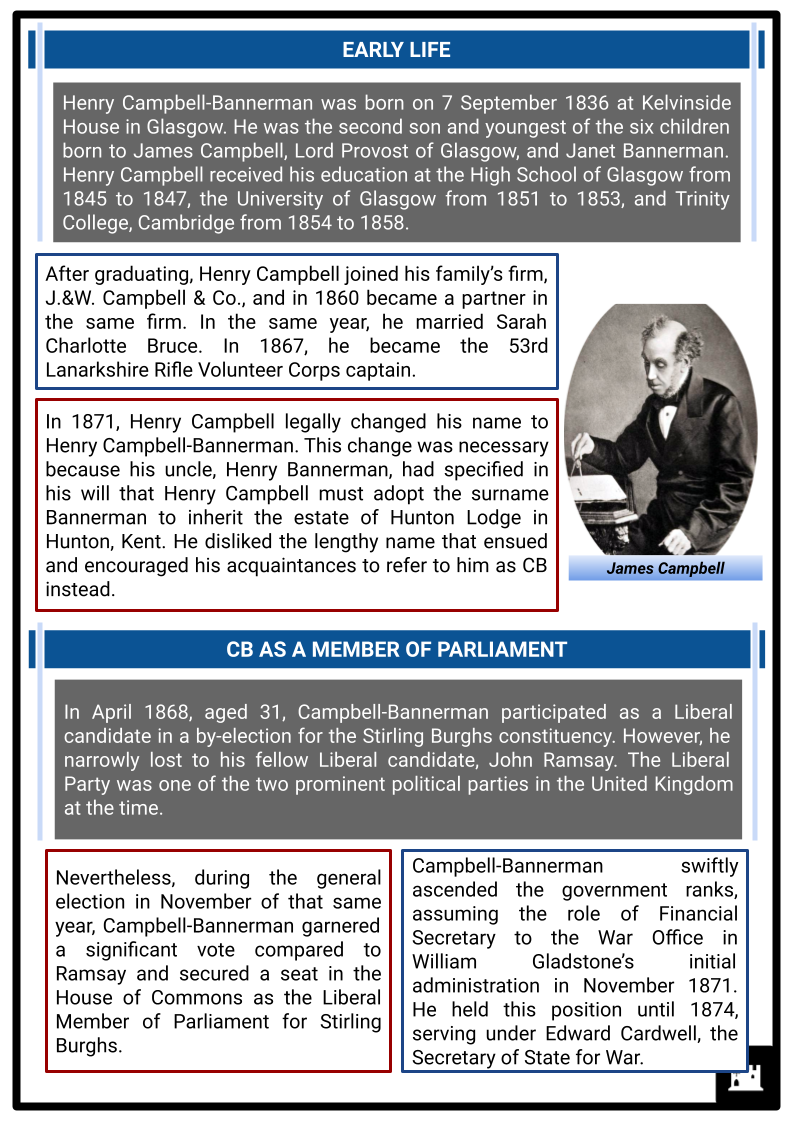
Student Activities
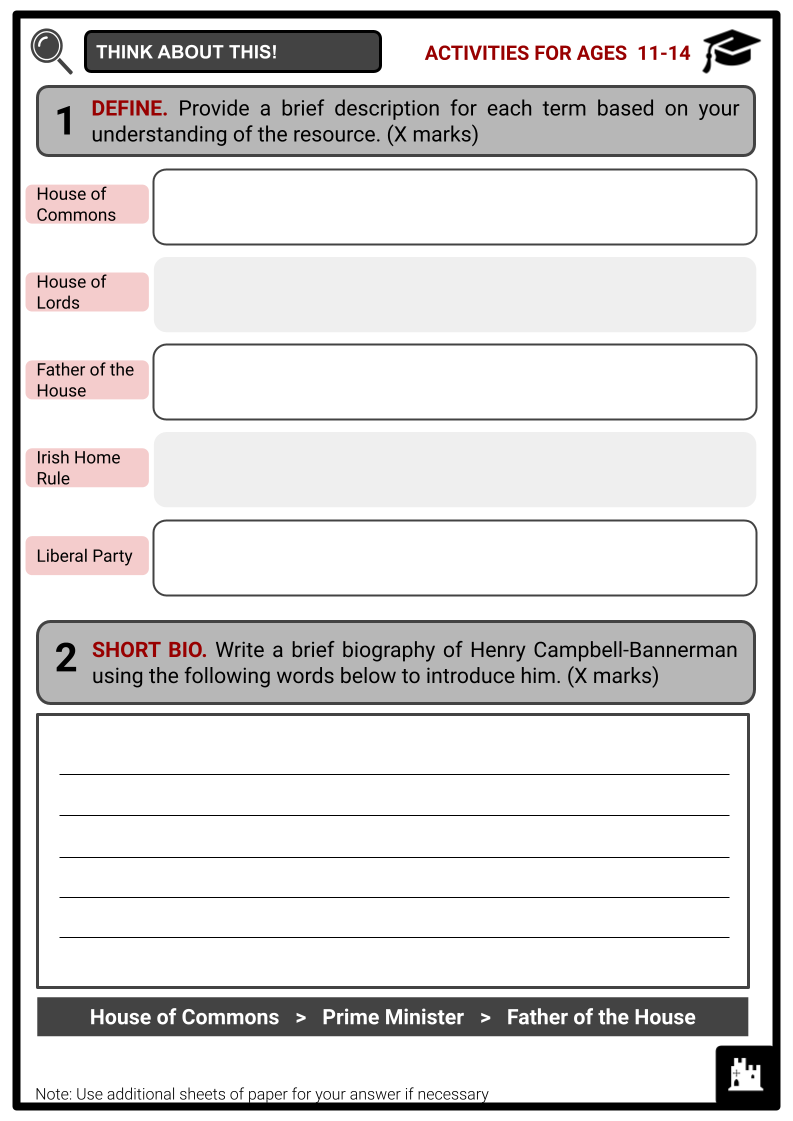
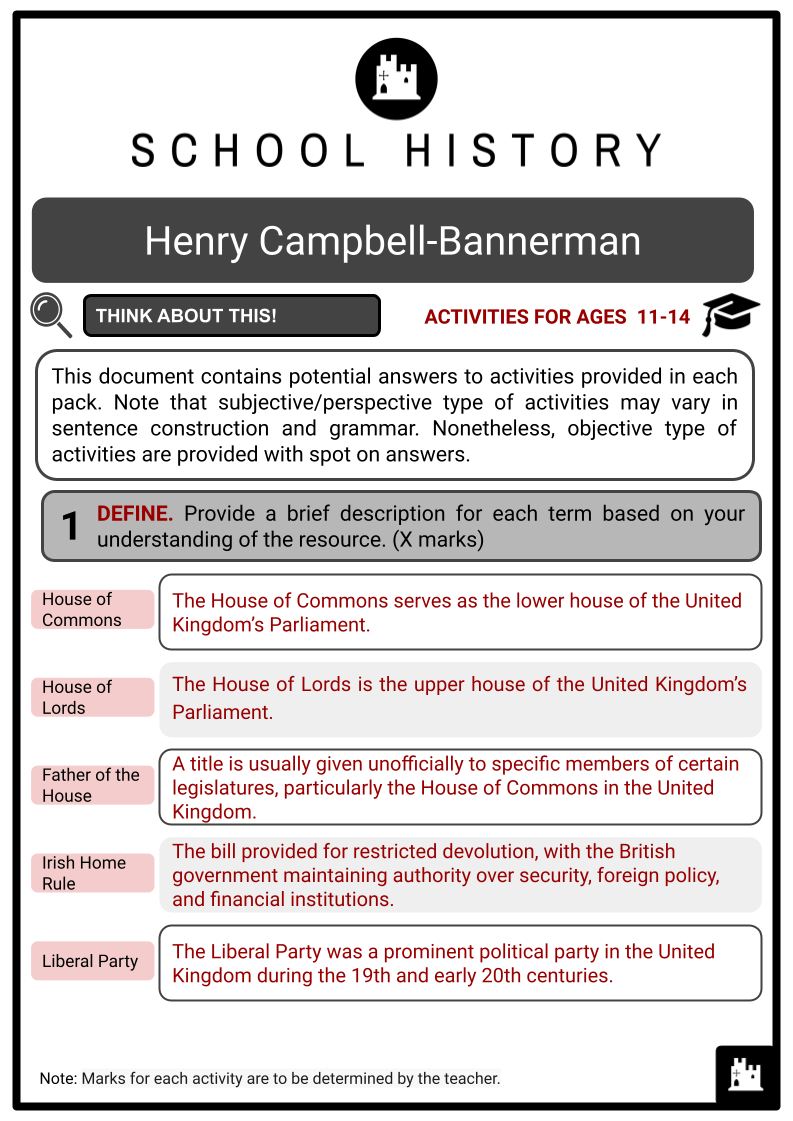
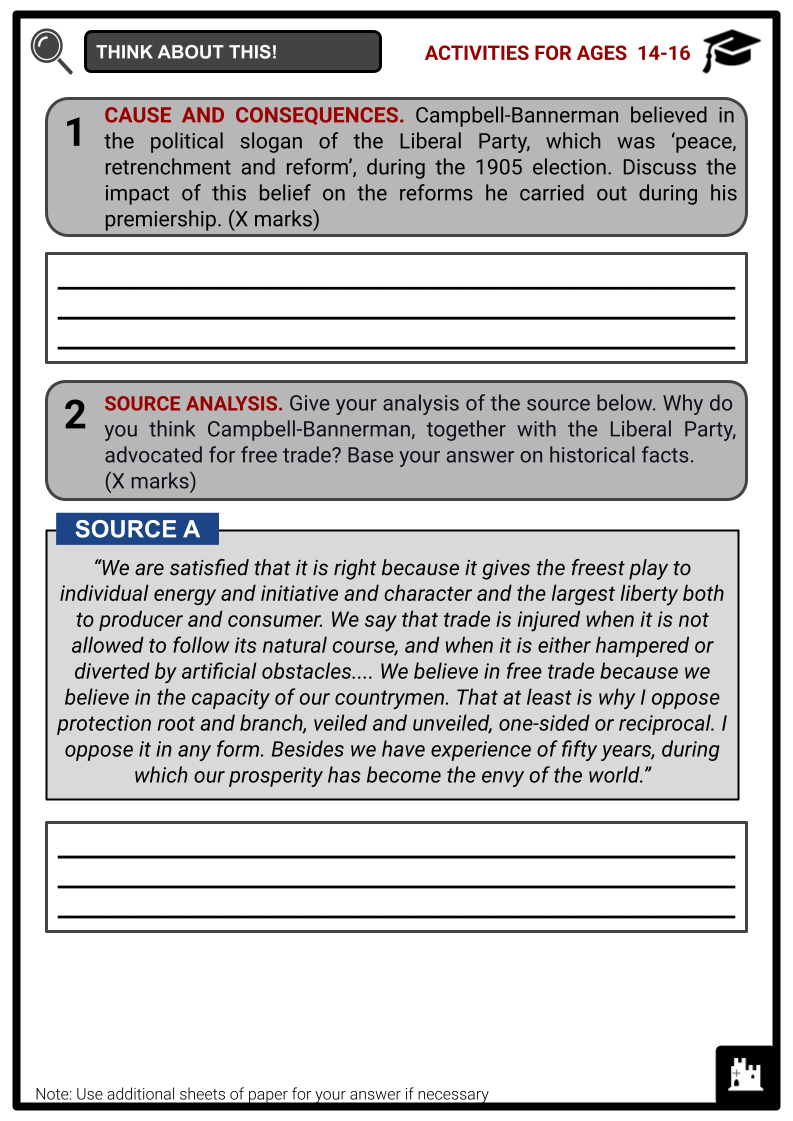
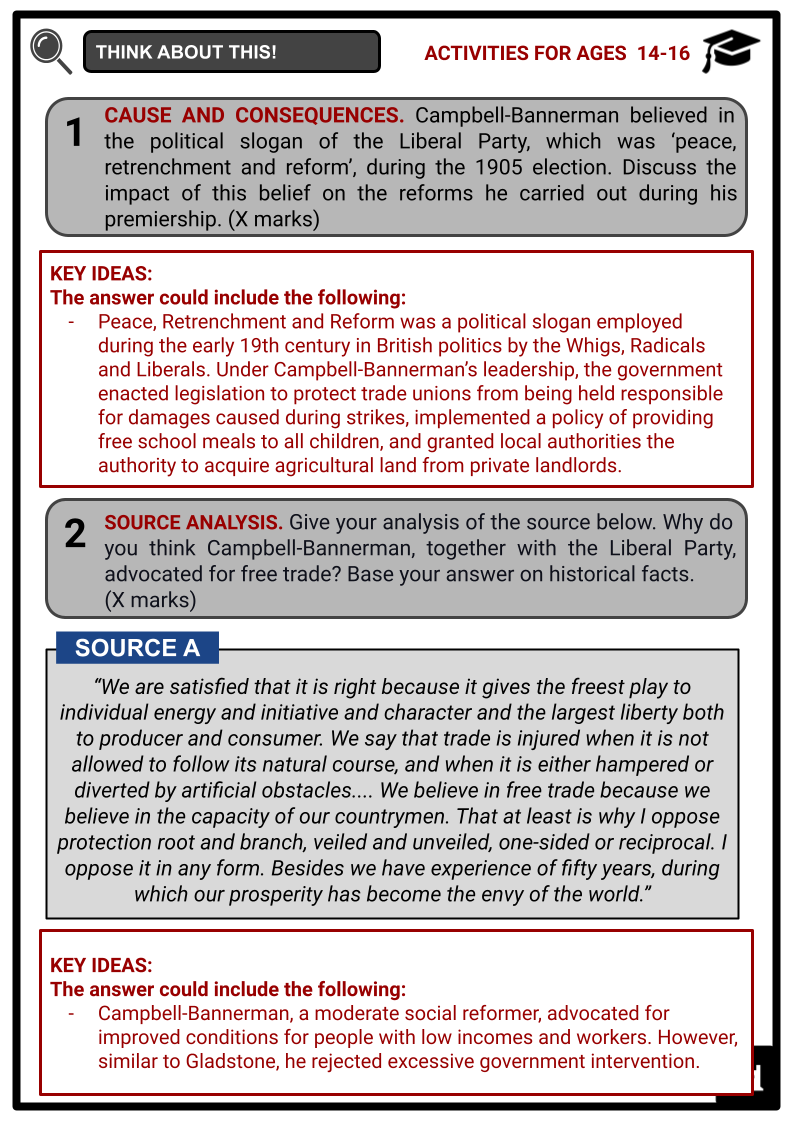
Summary
- Early Life
- CB as a Member of Parliament
- Leader of the Liberal Party
- Premiership
- Legacy and Death
Key Facts And Information
Let’s know more about Henry Campbell-Bannerman!
Sir Henry Campbell-Bannerman, a British statesman and Liberal politician, held the position of Prime Minister of the United Kingdom from 1905 to 1908 and served as the Leader of the Liberal Party from 1899 to 1908. Campbell-Bannerman was the first Lord of the Treasury to be officially called the Prime Minister. CB, as he was commonly referred to, strongly advocated for free trade, Irish Home Rule, and improving socioeconomic circumstances. Thanks to his popularity, he was able to bring together his own Liberal Party and the exceptionally strong cabinet that he led.
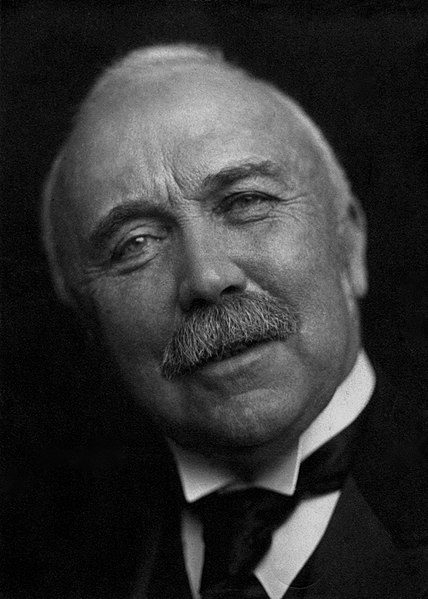
EARLY LIFE
- Henry Campbell-Bannerman was born on 7 September 1836 at Kelvinside House in Glasgow. He was the second son and youngest of the six children born to James Campbell, Lord Provost of Glasgow, and Janet Bannerman. Henry Campbell received his education at the High School of Glasgow from 1845 to 1847, the University of Glasgow from 1851 to 1853, and Trinity College, Cambridge from 1854 to 1858.
- After graduating, Henry Campbell joined his family’s firm, J.&W. Campbell & Co., and in 1860 became a partner in the same firm. In the same year, he married Sarah Charlotte Bruce. In 1867, he became the 53rd Lanarkshire Rifle Volunteer Corps captain.
- In 1871, Henry Campbell legally changed his name to Henry Campbell-Bannerman. This change was necessary because his uncle, Henry Bannerman, had specified in his will that Henry Campbell must adopt the surname Bannerman to inherit the estate of Hunton Lodge in Hunton, Kent. He disliked the lengthy name that ensued and encouraged his acquaintances to refer to him as CB instead.
CB AS A MEMBER OF PARLIAMENT
- In April 1868, aged 31, Campbell-Bannerman participated as a Liberal candidate in a by-election for the Stirling Burghs constituency. However, he narrowly lost to his fellow Liberal candidate, John Ramsay. The Liberal Party was one of the two prominent political parties in the United Kingdom at the time.
- Nevertheless, during the general election in November of that same year, Campbell-Bannerman garnered a significant vote compared to Ramsay and secured a seat in the House of Commons as the Liberal Member of Parliament for Stirling Burghs.
- Campbell-Bannerman swiftly ascended the government ranks, assuming the role of Financial Secretary to the War Office in William Gladstone’s initial administration in November 1871. He held this position until 1874, serving under Edward Cardwell, the Secretary of State for War.
- Upon Cardwell’s promotion to the peerage, Campbell-Bannerman assumed the role of the primary advocate for defence affairs in the House of Commons for the Liberal government. From 1880 to 1882, he was assigned to the same position in Gladstone’s second government.
- Following his service as Parliamentary and Financial Secretary to the Admiralty from 1882 to 1884, Campbell-Bannerman was promoted to the Cabinet as Chief Secretary for Ireland in 1884. This played a significant role during the First Home Rule Bill debates in 1886.
- The First Home Rule Bill was the initial significant endeavour of the British administration to pass legislation establishing home rule for a portion of the United Kingdom of Great Britain and Ireland. Gladstone proposed establishing a devolved assembly for Ireland that would have the authority to administer specific sections of Ireland.
- Campbell-Bannerman held the Secretary of State for War position in Gladstone’s third and fourth ministries (1886 and 1892 to 1894) and in Archibald Philip Primrose, 5th Earl of Rosebery’s cabinet (1894 to 1895).
- While serving in the War Office, he implemented a trial period of an eight-hour workday for the employees at the Woolwich Arsenal weapons production. The result indicated that there was no decline in productivity.
- As a result, Campbell-Bannerman expanded the workday duration to eight hours for the Army Clothing Department.
- Campbell-Bannerman convinced Prince George, Duke of Cambridge to step down from his position as Commander-in-Chief of the British Armed Forces. Campbell-Bannerman was awarded a knighthood afterwards.
- In 1895, Campbell inadvertently caused the downfall of Rosebery’s cabinet, as Rosebery’s government was defeated in a vote about Campbell-Bannerman’s management of cordite reserves.
- Unionist Members of Parliament unexpectedly passed a resolution of censure, which resulted in the effective removal of Rosebery from office and the subsequent return to power of Robert Arthur Talbot Gascoyne-Cecil, 3rd Marquess of Salisbury.
- Following the 1895 general election, Campbell-Bannerman actively campaigned to replace Arthur Wellesley Peel as the Speaker of the House of Commons. One of his motivations was to secure a less demanding position in public affairs.
- Rosebery, supported by Sir William Harcourt, the Liberal Leader in the House of Commons, declined because Campbell-Bannerman was considered essential to the Government’s front-bench team in the lower House.
LEADER OF THE LIBERAL PARTY
- On 6 February 1899, Campbell-Bannerman assumed the role of Leader of the Liberals in the House of Commons and Leader of the Opposition after William Vernon Harcourt. The Boer War of 1899 caused a division within the Liberal Party, forming Imperialist and Pro-Boer groups.
- Campbell-Bannerman was confronted with the challenging responsibility of maintaining unity within the Liberal Party, which ultimately and predictably suffered a defeat in the 1900 election.
- The Liberal Party achieved unity by rallying against the Education Act of 1902 and the Brussels Sugar Convention of 1902.
- The Education Act 1902 allocated monies for denominational religious instruction at voluntary elementary schools, most of which were owned by the Church of England and the Roman Catholics. The purpose of the Brussels Sugar Convention of 1902 was to facilitate the progressive elimination of export bounties, after which Britain would prohibit importing subsidised sugar.
- Joseph Chamberlain’s Tariff Reform proposals in May 1903 presented the Liberals with a compelling and unifying subject to campaign for, as they were protectionist in character.
- In 1903, Herbert Gladstone, the Chief Whip of the Liberal Party, entered into a deal with Ramsay MacDonald from the Labour Representation Committee (LRC). The agreement involved withdrawing Liberal candidates in specific constituencies to support LRC candidates. At the same time, the LRC would reciprocate by withdrawing their candidates in other constituencies to support the Liberals.
PREMIERSHIP
- In December 1905, the Liberals regained power after Arthur Balfour stepped down as prime minister. This led King Edward VII to invite Campbell-Bannerman to establish a minority government, making him the first Liberal prime minister of the 20th century. At 69, Campbell-Bannerman became the oldest man to assume the position of prime minister.
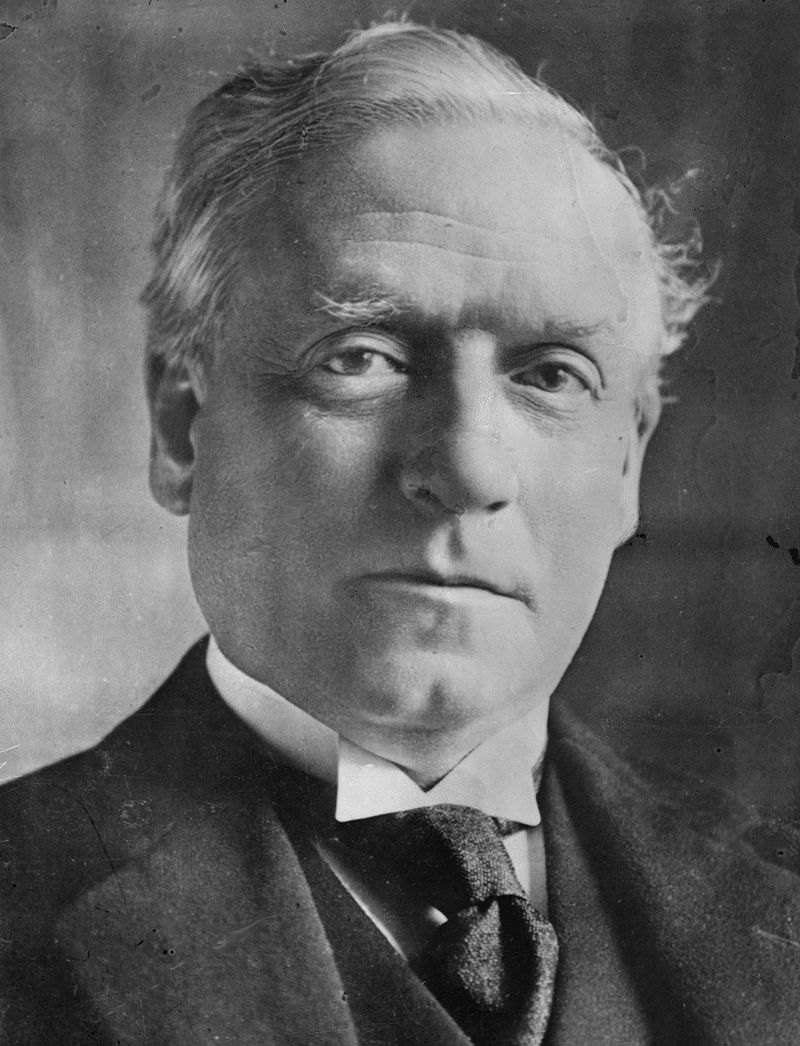
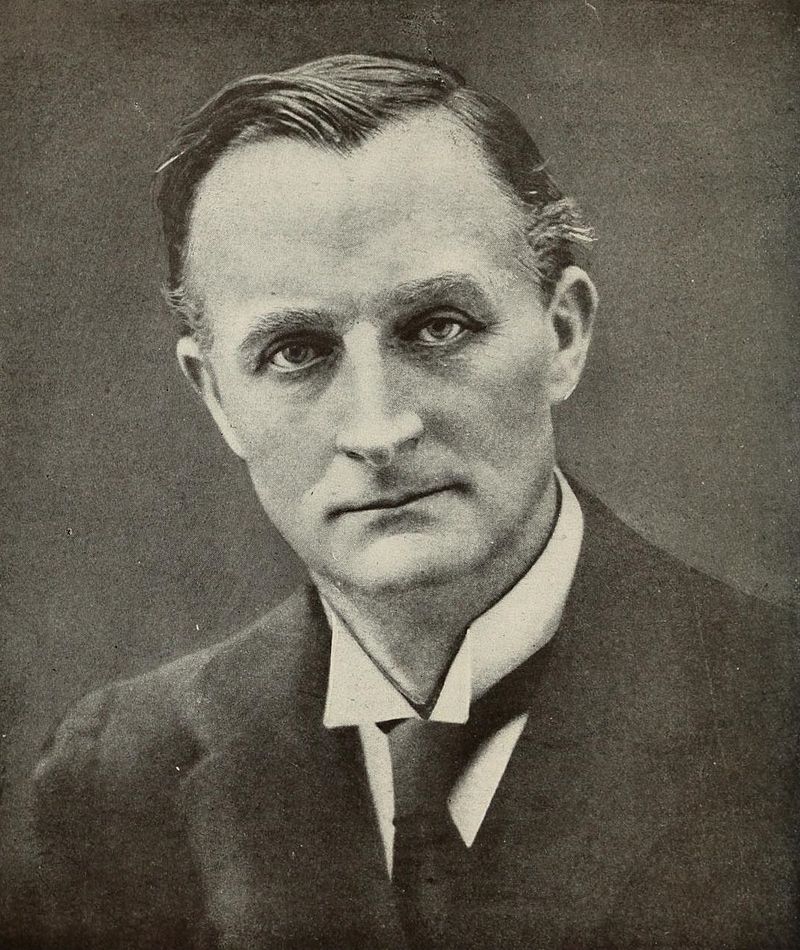
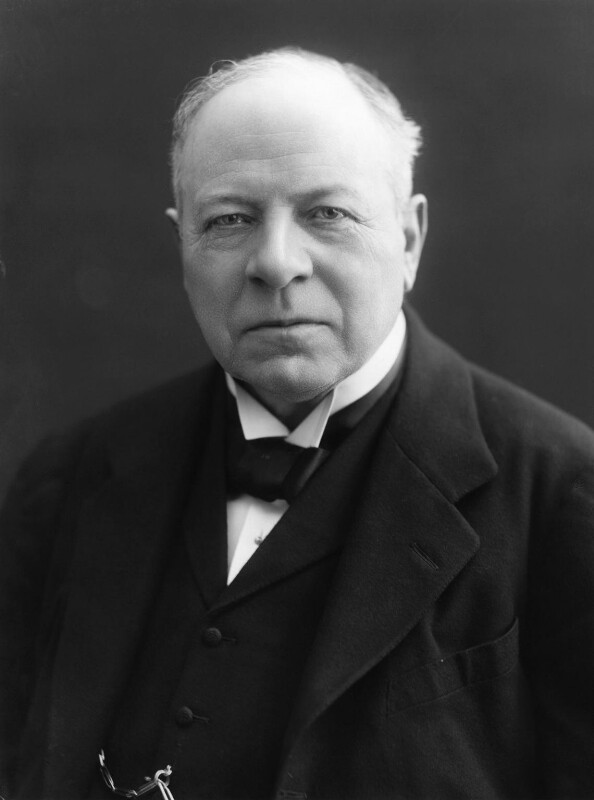
- Campbell-Bannerman encountered internal challenges within his party due to the Relugas Compact formed by Herbert Henry Asquith, Edward Grey and Richard Haldane. This agreement aimed to compel Campbell-Bannerman to join the House of Lords, thereby diminishing his power as prime minister and effectively enabling Asquith to govern as the Leader of the House of Commons.
- Campbell-Bannerman resolved these concerns by offering Asquith, Grey and Haldane the jobs of chancellor of the exchequer, foreign secretary, and secretary of state for war, respectively.
- All three accepted Campbell-Bannerman’s offer. He then dissolved Parliament and called for a general election. Assisted by the Lib-Lab pact that he had made, the divisions among the Conservatives regarding free trade, and the successful election campaign that he conducted, the Liberals achieved a resounding victory, securing 216 seats. A Lib-Lab pact in British politics refers to a functional agreement between the Liberal Party and the Labour Party.
- Campbell-Bannerman was the inaugural First Lord of the Treasury to be granted formal usage of the designation Prime Minister, a practice that remains in effect today. In 1907, he earned the title of Father of the House due to his status as the member of Parliament with the most extended uninterrupted service. He is the only British prime minister to have held this distinction while still in office.
Social Reforms
- Trade Disputes Act 1906The Act was prompted by a series of instances in the House of Lords when trade unions were liable for damages in tort for engaging in strikes.
- Workmen’s Compensation Act 1906A piece of legislation passed by the Parliament of the United Kingdom that addresses explicitly the entitlement of employed individuals to receive financial reparation for any harm or injury they sustain.
- Probation of Offenders Act 1907The Act grants courts the authority to dismiss a charge that has been tried summarily against a person, even if the court believes the charge has been proven. Alternatively, the Act empowers judges to discharge a defendant conditionally.
Foreign Affairs
- 1907 Imperial ConferenceThe 1907 Imperial Conference occurred in London from 15 April 1907 to 14 May 1907. A resolution was adopted during the sessions to rename this and any future meetings to Imperial Conferences. Campbell-Bannerman was the conference’s chairman.
- Union of South Africa in 1910The administration led by Campbell-Bannerman awarded the Boer nations, namely the Transvaal and the Orange River Colony, the ability to govern themselves within the British Empire. This was achieved through an Order in Council, which allowed them to circumvent the House of Lords.
LEGACY AND DEATH
- Shortly after assuming the position of Father of the House in 1907, Campbell-Bannerman’s health deteriorated. After experiencing a sequence of cardiac arrests, with the most severe being in November 1907, he developed a concern that he might not live long enough to complete his tenure.
- Nevertheless, his health deteriorated at an accelerated rate compared to earlier, ultimately resulting in his death on 22 April 1908, a mere 19 days after his resignation. Campbell-Bannerman was interred in the churchyard of Meigle Parish Church, located in Perthshire, near Belmont Castle. Meigle Parish Church had been his residence since 1887. A stone plaque was positioned on the church’s outer wall, serving as a memorial to Campbell-Bannerman.
Frequently Asked Questions
- Who was Henry Campbell-Bannerman?
Henry Campbell-Bannerman was a British statesman who served as Prime Minister of the United Kingdom from 1905 to 1908. He was the leader of the Liberal Party and had a significant impact on British politics during the early 20th century.
- What was Henry Campbell-Bannerman's role in British politics before becoming Prime Minister?
Before becoming Prime Minister, Campbell-Bannerman served in various government positions, including Chief Secretary for Ireland and Secretary of State for War. He also held leadership positions within the Liberal Party.
- What were some of Henry Campbell-Bannerman's major achievements as Prime Minister?
Campbell-Bannerman's tenure as Prime Minister saw several important reforms, including the introduction of old-age pensions and the passage of the Education Act of 1906, which laid the foundation for universal education in England and Wales.
